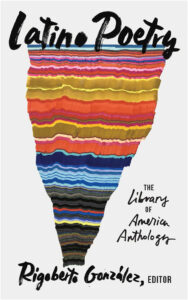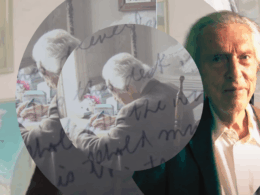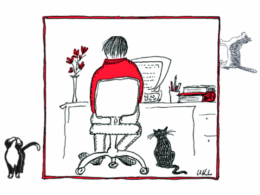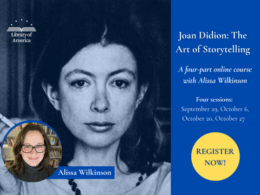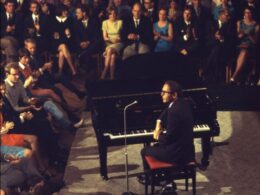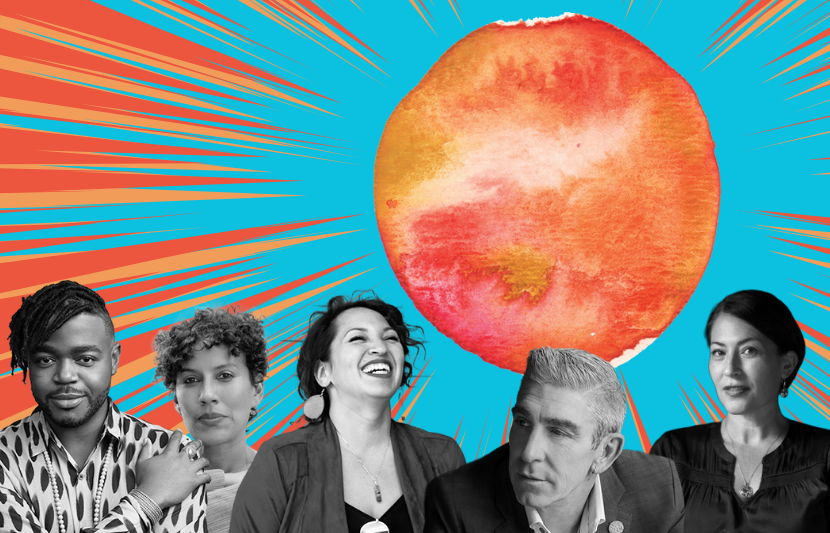
Poets Darrel Alejandro Holnes (photo: Beowulf Sheehan), Aracelis Girmay (Stanford University), Laurie Ann Guerrero (Paola Valenzuela), Richard Blanco (Matt Stagliano), and Ada Limón (Lucas Marquardt)
The vast and multifarious tradition of Latino poetry in America—spanning more than five centuries, transcending national borders, encompassing dozens of distinctive movements and styles—resists easy summary. As poet and critic Rigoberto González, editor of the just-released Latino Poetry: The Library of America Anthology, remarks, “We are not just one story, we are not just one people. We can be many different stories, many different peoples. Even one individual can represent that.” The Puerto Rico–born poet Tato Laviera calls the phenomenon by another name: a “tremendous continental MIXTURAO.”
This electrifying outpouring of lyrical imagination, forged from braided strands of language, family, art, identity, and diasporic experience, leaps off the anthology’s pages, and acts as the connective thread for Latino Poetry: Places We Call Home, a major public humanities initiative in 2024–2025 directed by Library of America with generous support from the National Endowment for the Humanities and Emerson Collective. With public events scheduled around the country, an extensive online archive of videos and essays to explore, and the groundbreaking Latino Poetry anthology as your guide, there’s never been a better time to immerse yourself in the imagination and beauty conjured by these visionary writers who continue to remake the tapestry of American verse.
As a starting point, we recommend checking out some readings from acclaimed poets featured in the anthology. Here’s recent Pulitzer Prize winner Brandon Som performing and commenting on “Nani,” Alberto Ríos’s moving sestina about the acts of care that emerge out of the language barrier between and grandson and grandmother:
Som says:
I think growing up in households where there was more than one language being spoken and having some understanding but not complete understanding, that’s a big part of my experience. I gravitate to these poems that are working trans-lingually, working in such a way that the understanding of Spanish, the misunderstanding of Spanish, the understanding of English, the misunderstanding of English, are so engrained in the consciousness of the poem. It’s really a way of seeing the world, of knowing the world, that is beautiful and exceptional. At the same time you grow up with such a shame of this experience—a shame that we don’t fully know our Spanish, or that our English isn’t good enough. But really, as these poems show, there’s such an abundance, such an expansiveness, such a gorgeousness to this way of being in the world.
Elsewhere, celebrated Afro–Puerto Rican poet Mayra Santos-Febres delivers a magisterial rendition of her work “Tinta / Ink,” then dives into the oceanic symbolism so central to the Caribbean and its diaspora.
Santos-Febres comments:
I like the fact that ink is usually black when you write. And I use ink, tinta, that material that we use to write by hand and virtually by computers, to tell the story of how we have been racialized by the color of our skin. I’m Black—I can be referred to as a Black woman, though my skin is a different tonality—but the blackness of [ink] is a wonderful metaphor for both the body, the skin, but also the act of writing on a white surface of paper. What I try to do is to expand the material and turn it into a symbol of embodied writing: how ink, tinta, can refer to both the skin and the life journey.
Approaching the material from another perspective is beloved actor, screenwriter, and author Sonia Manzano—perhaps best known as Sesame Street’s Maria—who read two dazzling Nuyorican poems to mark the start of Hispanic Heritage Month this September. Sharing “Trio los Condes,” Victor Hernandez Cruz’s dreamlike ode to the music of the internationally famous singing group, Manzano recalls how she spent Friday nights as a child listening to the group’s nostalgically lush melodies with her Puerto Rico–born parents. For “The Broken English Dream” by Pedro Pietri, Manzano pairs a witty, engaging reading with a poignant memory of seeing the legendary poet perform his work.
And that’s just scratching the surface. We recommend visiting the Poems & Poets page of latinopoetry.org, clicking one of the more than twenty featured pieces, and then following along with the full text of a poem while listening to a clip of it being read aloud. Check out the links below for a sampling:
“Alabanza: In Praise of Local 100” by Martín Espada
“Arroz con Son y Clave” by Willie Perdomo
“Como Tú / Like You / Like Me” by Richard Blanco
“Cristo Negro de Portobelo” by Darrel Alejandro Holnes
“Duke Ellington, Santa Ana, El Salvador, 1974” by William Archila
“In Colorado My Father Scoured and Stacked Dishes” by Eduardo C. Corral
“Mexican American Disambiguation” by José Olivarez
“Operation Wetback, 1953” by Diana García
“The Black Maria” by Aracelis Girmay
“The End of Poetry” by Ada Limón
Want to witness the power of Latino Poetry firsthand? From September 2024 through April 2025, Places We Call Home will bring free public programs to thirty-two states, the District of Columbia, and Puerto Rico, including signature events in Los Angeles, Miami, San Antonio, Houston, New York City, San Juan, and Mayagüez. See the calendar of events on latinopoetry.org to find out what’s happening near you, and watch a recording of our 9/19 Chicago launch event below:
